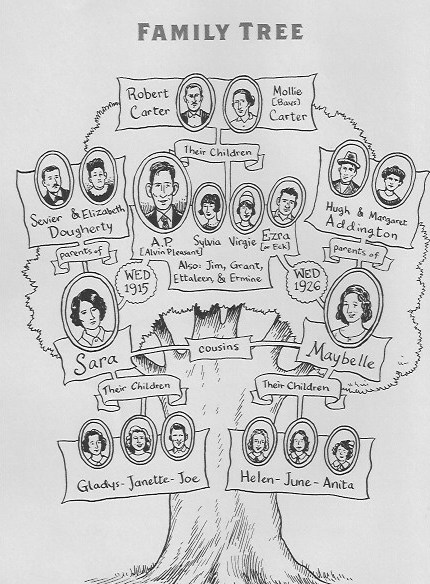 As the Newton Family Singers prepare for a set of songs written and performed by Johnny Cash and his in-laws, the Carter Family, I read two graphic novel biographies to learn more about these personalities. Johnny Cash: I See a Darkness by Reinhard Kleist follows Cash through his early years, as a youngster and through his drug problems, meeting June Carter and performing the Folsom Prison concert before jumping ahead to a sort of epilogue where he is recording the American sessions with Rick Rubin and looking back. The Carter Family: Don’t Forget This Song begins with Alvin Pleasant Carter showing musical interest as a toddler, and then collecting songs and performing with his wife Sara and her cousin (and his brother’s wife) Maybelle on record and radio. AP and Sara’s daughter Janette sings with them, too, and the book ends when the original configuration basically retires and Maybelle’s daughters -- Helen, June and Anita -- form the Carter Sisters. Both books are entertaining and informative and they shape their narrative in different ways. Johnny Cash tells a fairly straightforward story known to anyone who has a basic understanding of Cash’s life (i.e. anyone who saw the Cash biopic “Walk the Line”) but intercuts the biographical story with vignettes of story based on Cash’s best known songs, like “Ghost Riders in the Sky.” The story of Billy taking his guns to town, and Sue searching for his father, are also told. Because some of the songs Cash wrote were inspired by his own life (the flood of “Five Feet High and Rising,” for example) and others were invented, some of these vignettes can be confusing for anyone not familiar with the Cash catalog. Did he actually kill a man in Reno?! (No.) Kleist’s art for Johnny Cash is full of hard slashing blacks against white, stylistically capturing the tortured, hotel trashing, pill popping Cash. (As a side note, while reading Methland I made the connection that Cash’s Benzedrine (“Bennies”) pills were an early prescribed form of methamphetamine. Johnny Cash was on meth!) For the most part, the characters, especially Johnny, June and Bob Dylan -- famous people for whom there are lots of references -- are drawn to be easily recognized. Frank Young and David Lasky’s Carter Family takes a different tack with their narrative. Their story is told almost like a serialized comic. Many “chapters” are 1-4 pages long, detailing a particular event -- Maybelle marrying AP’s brother Eck, or AP asking his publisher to give songwriting credit to a fellow song collector. Being less familiar with the Carter Family’s story, some of these events suggested portent (Janette saving up for her own autoharp and AP buying chickens with the money instead) or highlights that I didn’t recognize (the dates for the first recordings of particular songs, for example). Like Johnny Cash, The Carter Family does not shy away from character flaws and bad choices. AP walks around with his head in the clouds, leaving for long stretches to find new songs; meanwhile, Sara meets her second husband, Coy Bays. In contrast, Eck and Maybelle are shown to have a happy marriage, investing in new technologies like a washing machine while AP and Sara always seem on the brink of bankruptcy. At one point, AP cuts down Sara’s favorite tree to make a cabinet out of the wood and her reaction shows the marriage is doomed. Young and Lasky’s story is told in color except for a section where the vignettes are shortened to a B/W four panel strip format for ten pages. The art is not particularly stylish or bold and the characters can sometimes be hard to distinguish, although the dialogue clears that up. The Carter Family also comes with a cd of radio recordings from 1939. In sum, both Johnny Cash: I See a Darkness and The Carter Family: Don’t Forget This Song are good introductions to the story of these performers but those familiar with their musical catalogs will undoubtedly get more out of them.
1 Comment
|
AuthorJack Cheng directs the Clemente Course in Dorchester, excavates in the Middle East, and writes in Waban, MA. Archives
October 2019
Categories |


 RSS Feed
RSS Feed
